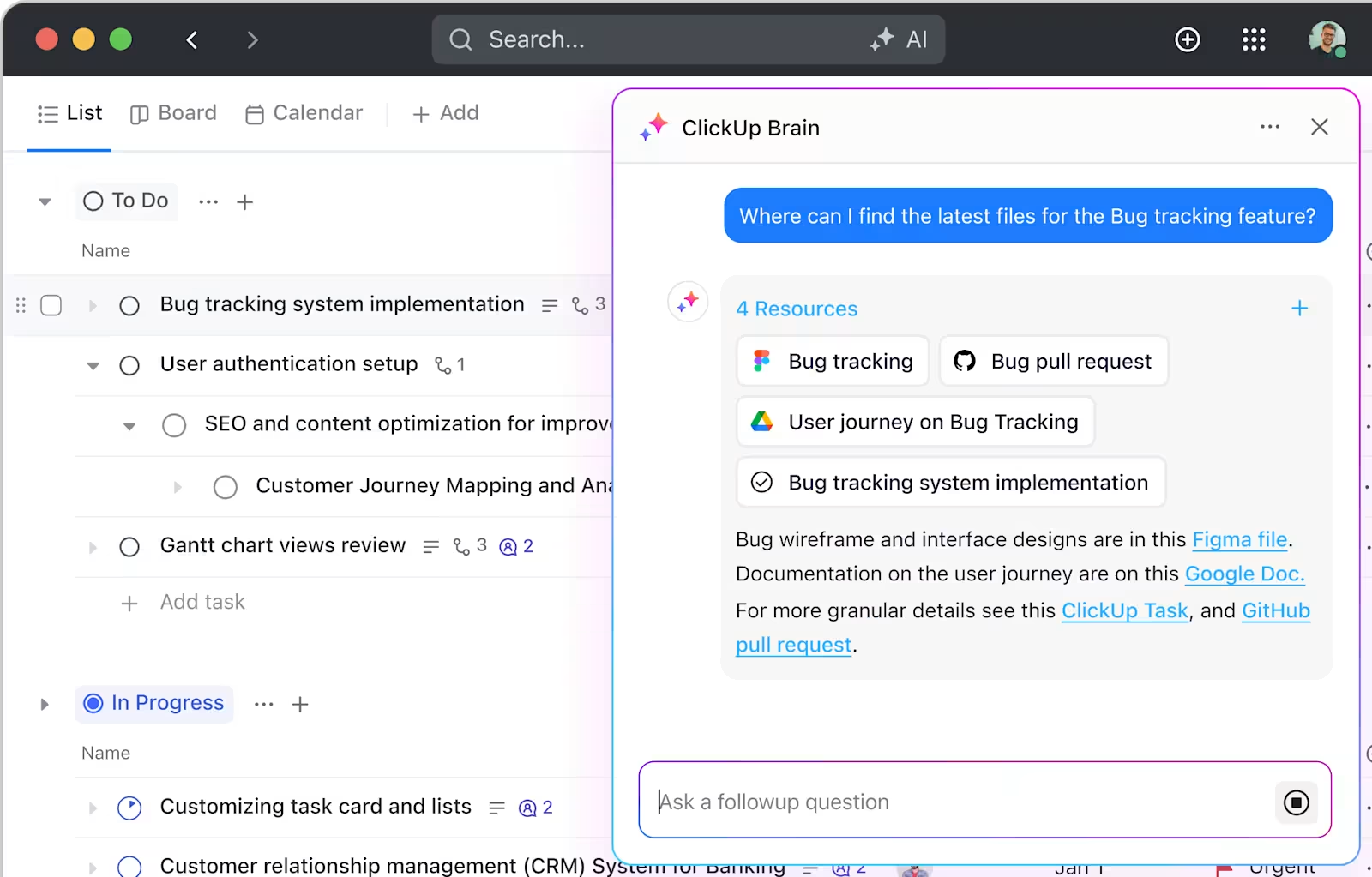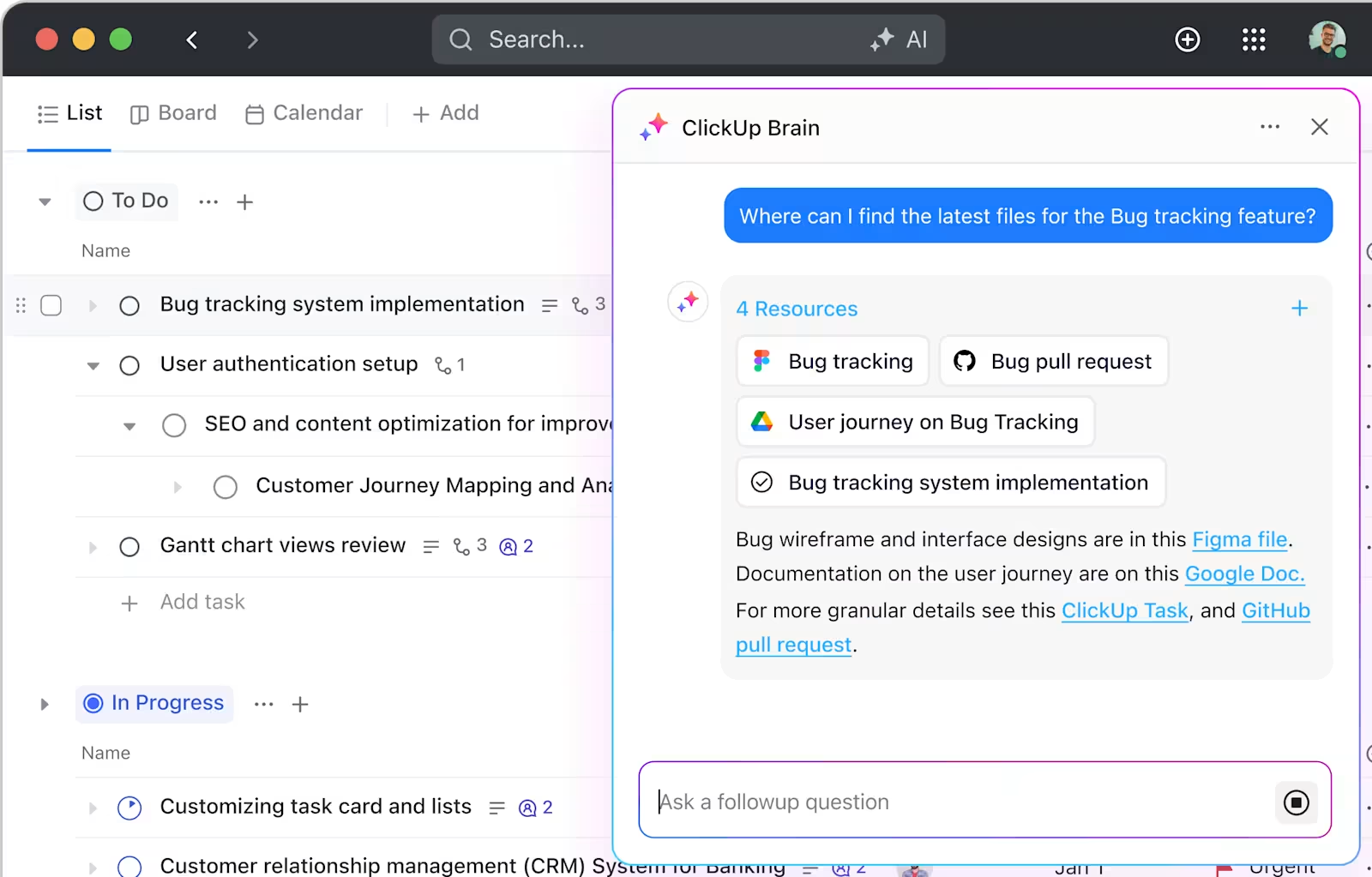Your support team spends 10 minutes digging for a single answer. Your marketers can’t find the latest asset. Internal search is live—but no one wants to use it (because it’s not particularly useful?). 🔎
So you brought in Coveo expecting smart, fast, intuitive search. But it’s not exactly what you expected. It’s a heavy platform made for large enterprises. But it also comes with workflows, features, and costs that your business may not need.
Coveo is built for large-scale, complex environments with advanced personalization and enterprise-grade requirements. But if you just need a reliable, easy-to-use search across content, tools, or support docs, it might be more trouble than it’s worth.
That’s why some companies are considering the switch to leaner, faster Coveo Relevance Cloud alternatives. These tools offer relevance, usability, and value, without the enterprise overhead.
In this guide, we break down the 10 best Coveo alternatives to help your team spend less time searching and more time working. ✅
- Why Go For Coveo Alternatives?
- Coveo Competitors at a Glance
- The Best Coveo Alternatives to Use
- 1. ClickUp (Best for integrating search within project management workflows)
- 2. Elastic Enterprise Search (Best for powering customizable search in e-commerce and customer-facing applications)
- 3. Algolia (Best for delivering fast, user-friendly, and typo-tolerant on-site search experiences)
- 4. Google Cloud Search (Best for searching across Google Workspace tools)
- 5. IBM Watson Discovery (Best for extracting insights from unstructured enterprise documents)
- 6. Lucidworks Fusion (Best for building large-scale, intelligent enterprise search apps with behavioral relevance)
- 7. Azure AI Search (Best for blending traditional and semantic search in Microsoft-integrated environments)
- 8. Sinequa (Best for enterprise-wide knowledge discovery with advanced NLP and expert search)
- 9. Yext (Best for managing and optimizing branded search experiences across digital channels)
- 10. Luigi’s Box (Best for enhancing product discovery and conversion in e-commerce platforms)
- 11. Lucene (Best for developers who need full control to build custom search functionality from scratch)
- Unlock Powerful Search and Knowledge Management with ClickUp
Why Go For Coveo Alternatives?
Coveo is an AI-powered enterprise search platform for websites, e-commerce sites, service portals, and internal tools. It helps business teams deliver personalized, relevant experiences through natural language processing and advanced analytics.
But if your team includes employees, contractors, and clients who need fast access to work content, a complex tool like Coveo might hurt more than help—especially when you’re trying to increase conversion rates or deliver more intuitive, results-based experiences. 💡
Here’s why you might consider top alternatives:
- Cost concerns: Pricing may feel too high, especially if you’re not using the full suite of enterprise features
- Implementation complexity: Setup can be lengthy and technically demanding, often requiring specialized expertise
- Limited relevance control: Fine-tuning search results is difficult due to reliance on opaque, black-box AI
- Vendor lock-in risks: A Tightly coupled ecosystem can make switching platforms or integrating with other tools challenging
- Overkill for simple use cases: Feature-rich platform may add unnecessary complexity and cost for basic needs
- Integration constraints: Dependence on Coveo’s connectors may limit flexibility and slow down workflows
🧐 Did You Know? Your brain can store 1 million gigabytes of memory—but it still can’t remember which folder the Q4 roadmap lives in. (Probably you’d need a tool like ClickUp 👀)
Coveo Competitors at a Glance
Let’s take a quick look at how the tools stack against each other in terms of features and pricing:
| Tool | Best for | Key features | Pricing* |
|---|---|---|---|
| ClickUp | Best for integrating search within project management workflows Team size: Ideal for teams needing search within tasks, docs, and comments | Connected search across tasks, docs, comments; AI-powered answers; Knowledge management | Free forever; Customization available for enterprises |
| Elastic Enterprise Search | Best for powering customizable search in e-commerce and customer-facing applications Team size: Ideal for mid-sized teams and enterprises | Customizable product search, typo tolerance, ranking controls, dashboards, enterprise security | Custom pricing |
| Algolia | Best for delivering fast, user-friendly, and typo-tolerant on-site search experiences Team size: Ideal for small to mid-sized teams and enterprises | Instant search UI, typo tolerance, AI recommendations, A/B testing | Free version available; Paid plans start at pay-as-you-go |
| Google Cloud Search | Best for searching across Google Workspace tools Team size: Ideal for small businesses and mid-sized teams | Google Workspace integration, proactive assist cards, natural language queries | Free trial; Custom pricing |
| IBM Watson Discovery | Best for extracting insights from unstructured enterprise documents Team size: Ideal for large enterprises | AI-powered passage retrieval, federated search, visual document understanding, flexible deployment | Pricing starts at $500/month |
| Lucidworks Fusion | Best for building large-scale, intelligent enterprise search apps with behavioral relevance Team size: Ideal for mid-sized teams and enterprises | Real-time ingestion, semantic vector search, signal processing, low-code app builder | Custom pricing |
| Azure AI Search | Best for blending traditional and semantic search in Microsoft-integrated environments Team size: Ideal for small to mid-sized teams | Semantic/vector search, Azure Cognitive Services enrichment, multimodal search | Free version available; Paid plans start at $73.73/month |
| Sinequa | Best for enterprise-wide knowledge discovery with advanced NLP and expert search Team size: Ideal for enterprises | AI-powered search assistants, compliance with SOC 2/ISO/HIPAA, expert discovery | Custom pricing |
| Yext | Best for managing and optimizing branded search experiences across digital channels Team size: Ideal for small to mid-sized teams and enterprises | Knowledge Graph, AI chat automation, review management, SEO optimization | Starts at $4/week |
| Luigi’s Box | Best for enhancing product discovery and conversion in e-commerce platforms Team size: Ideal for small and mid-sized teams | Voice & visual search, advanced analytics, multilingual/currency support, product recommendations | Custom pricing |
| Apache Lucene | Best for developers who need full control to build custom search functionality from scratch Team size: Ideal for developers and enterprises needing control | Full-text indexing, ranked retrieval, wildcard/phrase/proximity queries, multi-index querying | Free, open-source |
The Best Coveo Alternatives to Use
Now let’s dive deeper into each tool and see what makes them a better fit than Coveo. 🛠️
1. ClickUp (Best for integrating search within project management workflows)
ClickUp, the everything app for work, combines your tasks, docs, and knowledge into a single system—so search isn’t just fast. It’s native, structured, and deeply contextual. Unlike other cloud services, ClickUp ties everything back to how your team works.
With ClickUp’s Connected Search, you can instantly search across your entire workspace, including tasks, lists, folders, spaces, and even comments, all from one powerful search bar. Advanced filters like assignees, due dates, tags, priorities, or status help you quickly narrow down search results and find exactly what matters.
🧐 Did You Know? You can save your most-used search filters as Favorites in ClickUp. For example: “@me AND overdue AND priority: high” becomes a one-click power tool for daily triage.
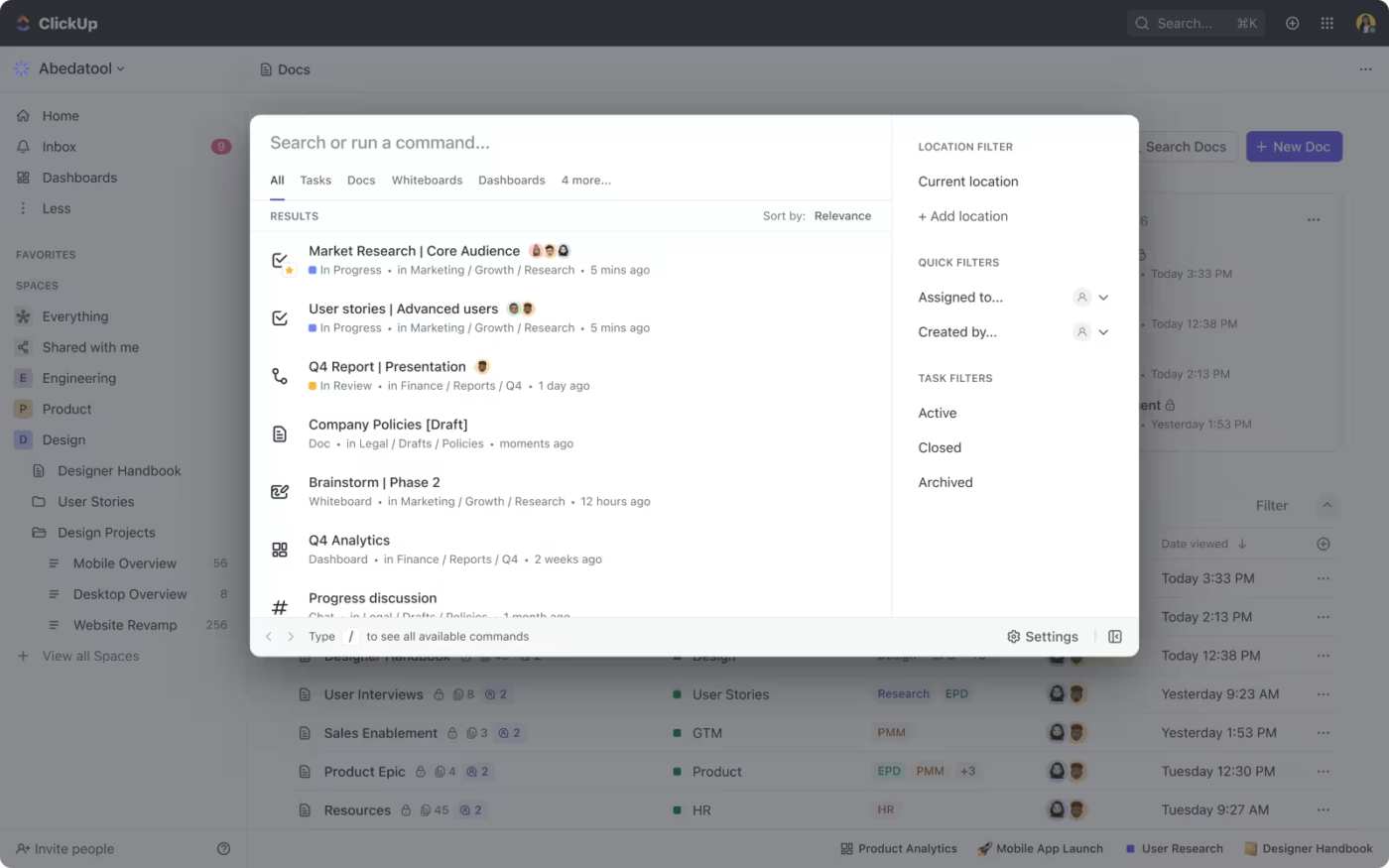
🔎 Unify knowledge and task search in one workspace
What makes it stand out? Unlike standalone search platforms, ClickUp goes beyond your internal workspace.
You can integrate Google Drive, Slack, Figma, GitHub, and more to unify results from all your connected tools. This makes it a powerful contender for the best alternative to Coveo for teams that want search embedded in their workflows, not bolted on.
And because search results always respect user permissions, sensitive information is always secure. You can even search inside attachments like PDFs, ensuring no critical detail gets missed. Whether you’re searching from your desktop or mobile device, everything is synced and accessible.
Plus, this connected AI offers autosuggestions to speed up your queries and improve accuracy, so you spend less time hunting and more time doing. Beyond simple keywords, you can search inside comments, specific files, or entire documents—without losing time or context.
With this intelligent search, you can instantly find any task, comment, or file across your workspace.
🧠 Create, store, and find dynamic documentation
When you want to create and organize the information your team needs, ClickUp Docs lets you build detailed, structured documents directly inside ClickUp. This centralizes all your knowledge and streamlines your document management workflows.
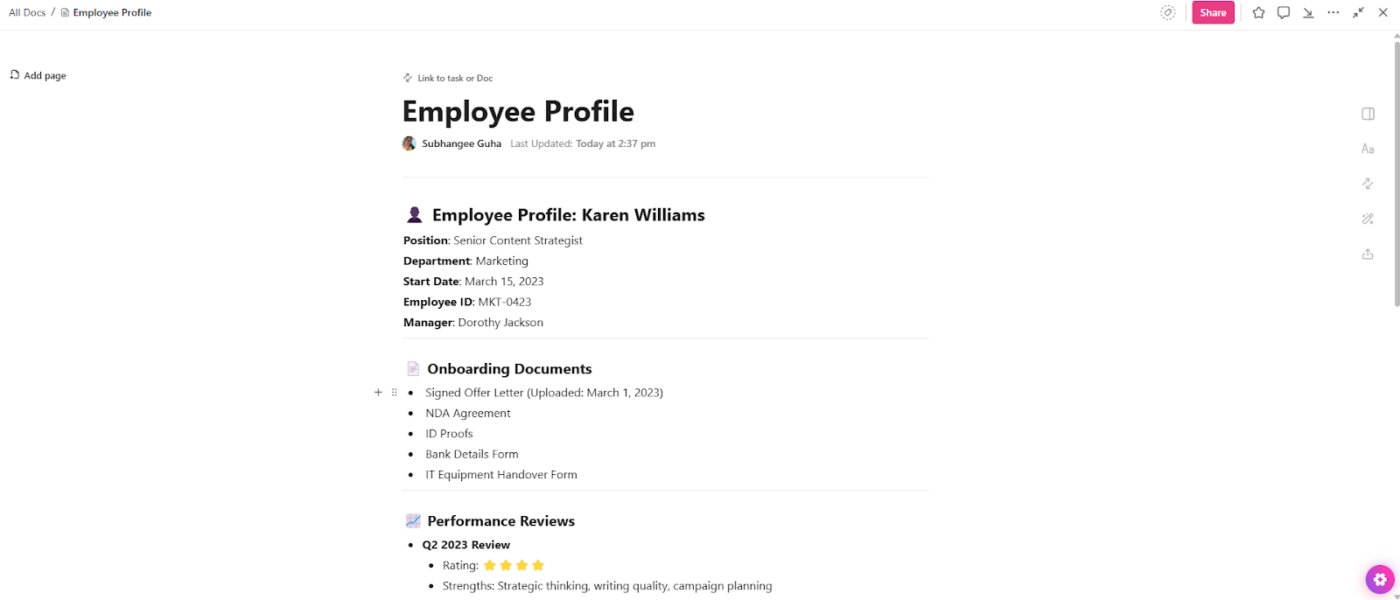
Create nested pages, embed tasks or views, and collaborate with your teammates in real time with comments and mentions. Every company Wiki document is automatically linked to your projects. Each doc acts like a live workspace—instantly searchable, interlinked, and always up to date.
With support for backlinks, references, and version history, ClickUp makes documentation dynamic and discoverable—ideal for organizing content into knowledge categories your team can easily browse and update.
💬 Make every idea, conversation, and plan searchable
But it doesn’t stop at docs. You also get real-time ClickUp Chat, threaded comments, and visual ClickUp Whiteboards, all fully searchable. Whether you’re planning, discussing, or brainstorming, ClickUp ensures you never lose track of conversations or ideas.
Once your team’s knowledge is built, ClickUp Knowledge Management gives you powerful tools to keep it organized. Assign owners and watchers, define clear Spaces and Folders, and manage granular permissions so the right employees can access the right information, and your clients only see what they need.
💡 Pro Tip: ClickUp’s search supports fuzzy logic—even partial matches will surface relevant results. This means your team doesn’t have to remember exact task names or file titles to find what they need.
Need quick answers from your workspace? ClickUp Brain uses AI to instantly surface specific information from tasks, docs, and projects—no manual digging required. You can also import your existing team knowledge into ClickUp, so nothing gets lost during transitions. Plus, customizable knowledge base templates make it easy to build consistent onboarding guides, process manuals, and project documentation.
ClickUp Brain helps you work even smarter once your knowledge is organized and accessible. You can quickly generate drafts for reports, emails, or meeting notes right inside ClickUp, saving you time on routine writing.
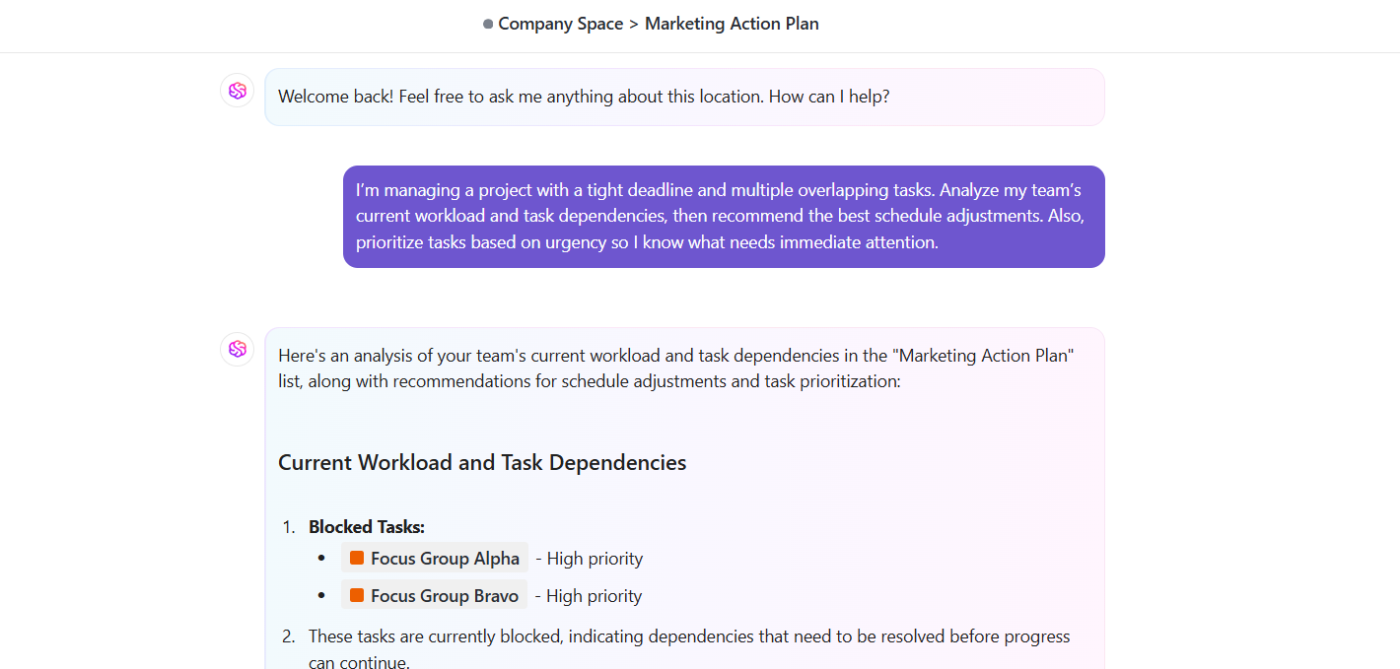
The AI capabilities also extend to the ClickUp AI Notetaker, which can join your meetings, take notes, and automatically generate transcripts and action items.
ClickUp blends artificial intelligence and knowledge management in ways that tools like Coveo simply can’t match. AI Agents can even answer workspace questions or take actions on your behalf, keeping your workflows moving while you focus on what matters.
💡 Pro Tip: Need a better way to manage client documents and internal resources? You can use ClickUp Forms to let visitors or team members request access, submit input, or contact your team directly—keeping everything in one centralized place.
ClickUp best features
- Automate task organization: Set rules to automatically tag, assign, or move tasks based on triggers and keep your workspace structured so your search results stay focused and useful
- Surface key information instantly: Build Custom Views and ClickUp Dashboards using Lists, Boards, or Tables to find information faster and reduce the need to search repeatedly
- Map relationships between tasks: Link tasks through dependencies or relationships to create a clear project structure and understand context when search pulls up related items
- Visual collaboration: Use ClickUp Whiteboards for brainstorming and planning, with all content searchable and linkable to tasks and docs
- Wiki-style navigation: Reference and backlink docs and tasks for seamless knowledge discovery
- Granular permissions: Search results always respect user roles and permissions, keeping sensitive information secure
- Mobile & accessibility: Access all features, including AI and search, on mobile devices with ongoing accessibility enhancements
ClickUp limitations
- The extensive feature set can make ClickUp feel complex for first-time users
ClickUp pricing
ClickUp ratings and reviews
- G2: 4.7/5 (9,000+ reviews)
- Capterra: 4.6/5 (4,000+ reviews)
What are real-life users saying about ClickUp?
A Capterra review says:
🎉 Fun Fact: In the early 2000s, enterprise search was modeled after web search (think Google), but today’s search is trending toward “workspace-native,” where you don’t just find info—you act on it instantly (assign a task, start a doc, reply to a comment). ClickUp exemplifies this evolution.
2. Elastic Enterprise Search (Best for powering customizable search in e-commerce and customer-facing applications)
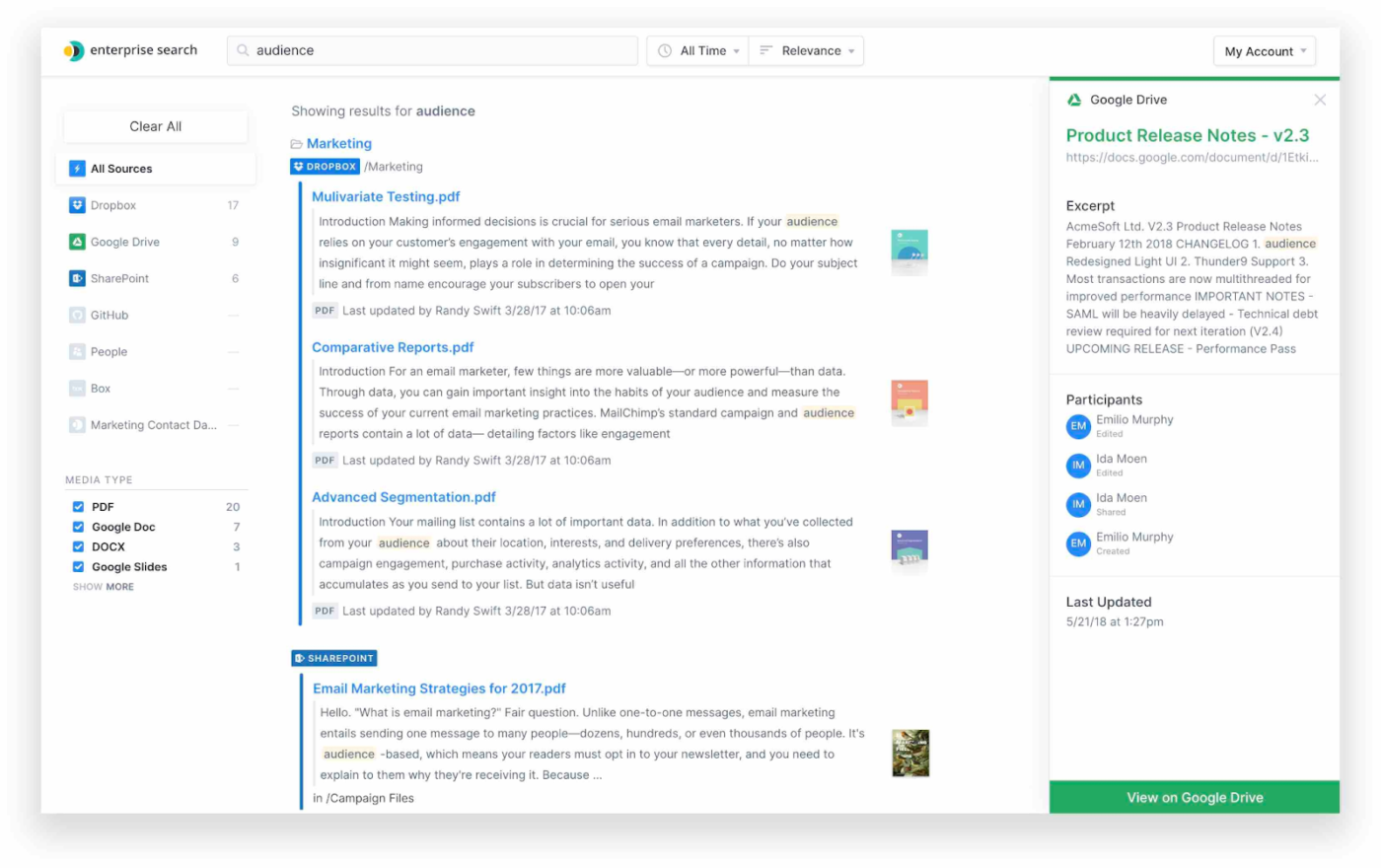
Elastic Enterprise Search offers two solutions—App Search and Workplace Search—both built on the power of Elasticsearch.
Elastic Enterprise Search helps your e-commerce store deliver fast, relevant product searches that keep customers engaged and drive sales. You can build a fully customizable search experience with filters, typo tolerance, and relevance controls tailored to your catalog.
Configuration is handled through Kibana, Elastic’s management UI, which also supports custom visualizations for user behavior and performance metrics. The intuitive precision tuning slider lets you promote best-sellers, prioritize in-stock items, or easily refine results.
Elastic Enterprise Search best features
- Provides detailed dashboards and reports on search queries, user behavior, and trends so you can continuously optimize search performance
- Supports synonym management to improve recall and ensure users find relevant results with varied terminology
- Integrates with enterprise security protocols such as SAML, LDAP, and OAuth to ensure secure access and compliance
Elastic Enterprise Search limitations
- Reindexing documents can get tricky, especially when the schema has changed significantly
- No cross-cluster replication support
Elastic Enterprise Search pricing
- Pricing: Custom pricing
Elastic Enterprise Search ratings and reviews
- G2: 4.3/5 (190+ reviews)
- Capterra: 4.5/5 (40+ reviews)
What are real-life users saying about Elastic Enterprise Search?
A Capterra review says:
📚 Also Read: Best Elasticsearch Alternatives
3. Algolia (Best for delivering fast, user-friendly, and typo-tolerant on-site search experiences)
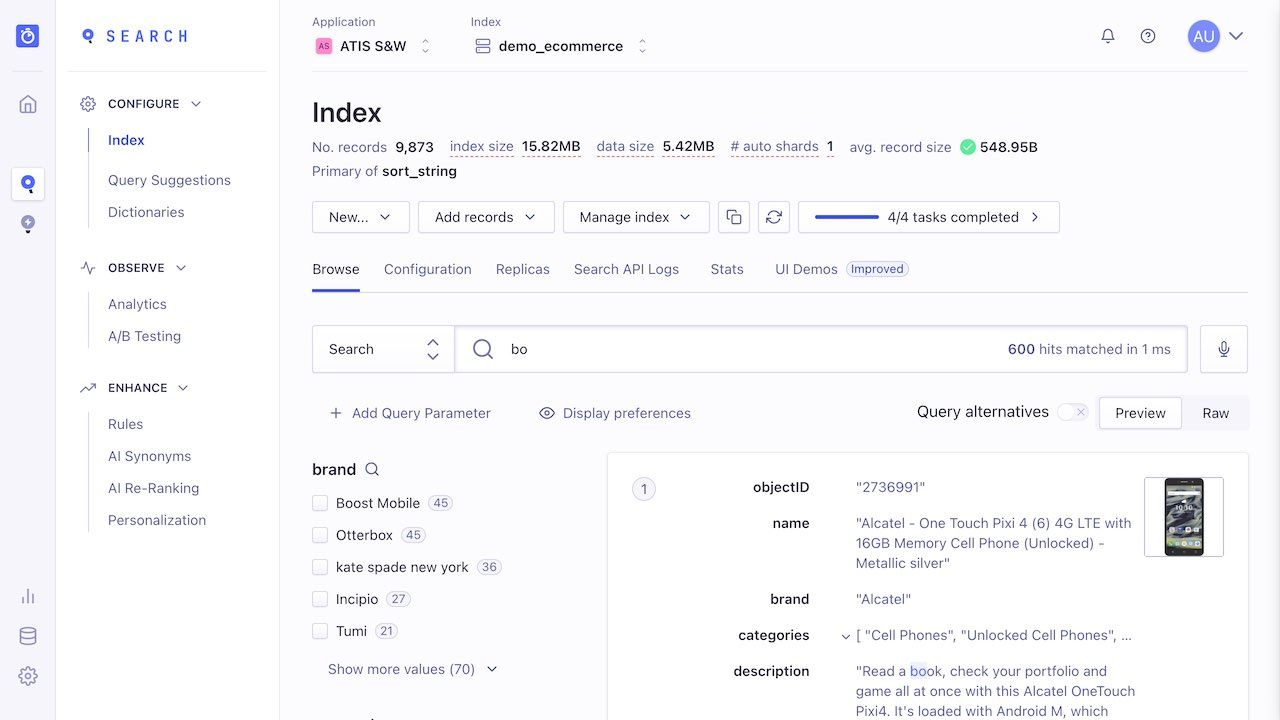
Algolia’s AI Search is a front-end library that helps you create responsive and flexible search interfaces. It includes features like Optimistic UI, which updates the interface immediately after a user action, even before the data is returned. Insights Events allow you to track user interactions, such as clicks and conversions, with minimal configuration.
Built-in ‘AI Recommendations’ help you suggest related content or products based on user behavior, and ‘Dynamic Widgets’ let your filters adjust automatically based on the data you receive, making your interface more flexible.
Algolia best features
- Provides location-based search results to help users see the most relevant items near them
- Handles spelling mistakes and typos to deliver accurate search results
- Allows you to experiment with different search configurations (A/B testing) and measure their impact on user behavior
Algolia limitations
- The system doesn’t fully support filtering arrays of objects across multiple fields
- Limited control over hosting—must use Algolia’s cloud
Algolia pricing
- Build: Free
- Grow: Free/pay-as-you-go
- Premium: Custom pricing
- Elevate: Custom pricing
Algolia ratings and reviews
- G2: 4.5/5 (400+ reviews)
- Capterra: 4.7/5 (70+ reviews)
What are real-life users saying about Algolia?
A G2 review says:
📮 ClickUp Insight: The average professional spends 30+ minutes a day searching for work-related information—that’s over 120 hours a year lost to digging through emails, Slack threads, and scattered files. An intelligent AI assistant embedded in your workspace can change that. Enter ClickUp Brain. It delivers instant insights and answers by surfacing the right documents, conversations, and task details in seconds—so you can stop searching and start working.
💫 Real Results: By eliminating outdated knowledge management processes, teams like QubicaAMF reclaimed 5+ hours weekly using ClickUp—that’s over 250 hours annually per person. Imagine what your team could create with an extra week of productivity every quarter!
4. Google Cloud Search (Best for searching across Google Workspace tools)
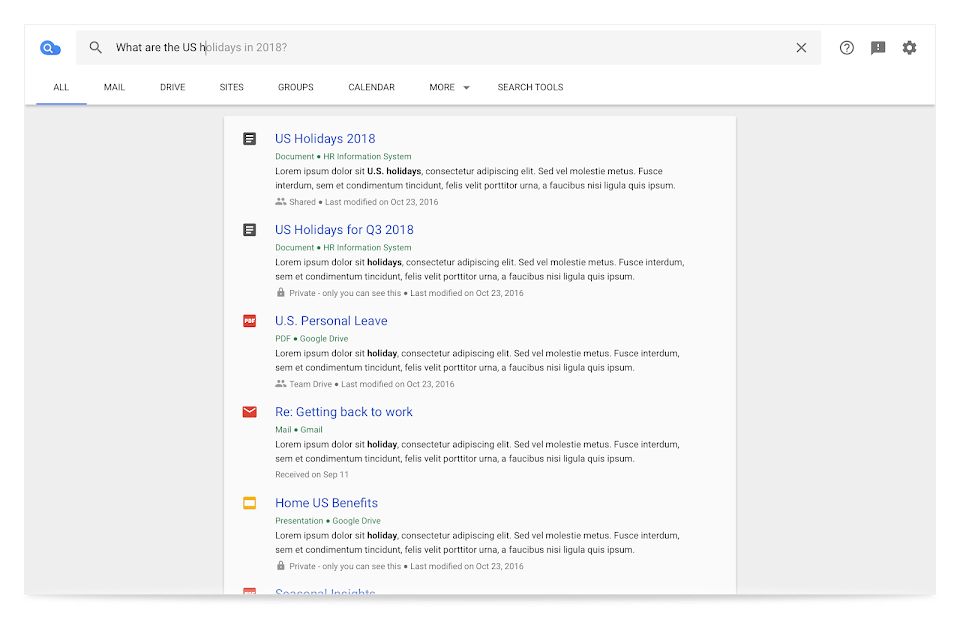
Google Cloud Search lets you quickly and securely find information across Gmail, Drive, Calendar, and other Google Workspace services. It retrieves data based on your queries and offers proactive recommendations through assist cards.
These cards surface relevant information like upcoming meetings, recent documents, and project updates, helping you stay organized and productive without manual searching. The system understands natural language, so you can ask questions like, “What files did John share with me last week?” and get accurate, context-aware answers.
Google Cloud Search best features
- Integrate external data sources using Cloud Search’s APIs and SDKs to index content from CRMs, databases, file systems, and more
- Build custom search experiences by embedding Cloud Search into intranet portals, mobile apps, or business applications
- Enable real-time access to information with near-instant indexing of updates across documents, emails, and other content
Google Cloud Search limitations
- Performance can occasionally lag, requiring configuration tweaks and optimizations
- Limited support for non-Google content sources
Google Cloud Search pricing
- Free trial
- Pay-as-you-ago
- Custom pricing
Google Cloud Search ratings and reviews
- G2: 4.3/5 (20+ reviews)
- Capterra: Not enough reviews
What are real-life users saying about Google Cloud Search?
A G2 review says:
💡 Pro Tip: If your team’s intranet feels more like a cluttered archive than a productivity tool, it might be time for an upgrade. Use this guide to design a smarter, more intuitive search experience that helps your team surface the right information when needed.
5. IBM Watson Discovery (Best for extracting insights from unstructured enterprise documents)
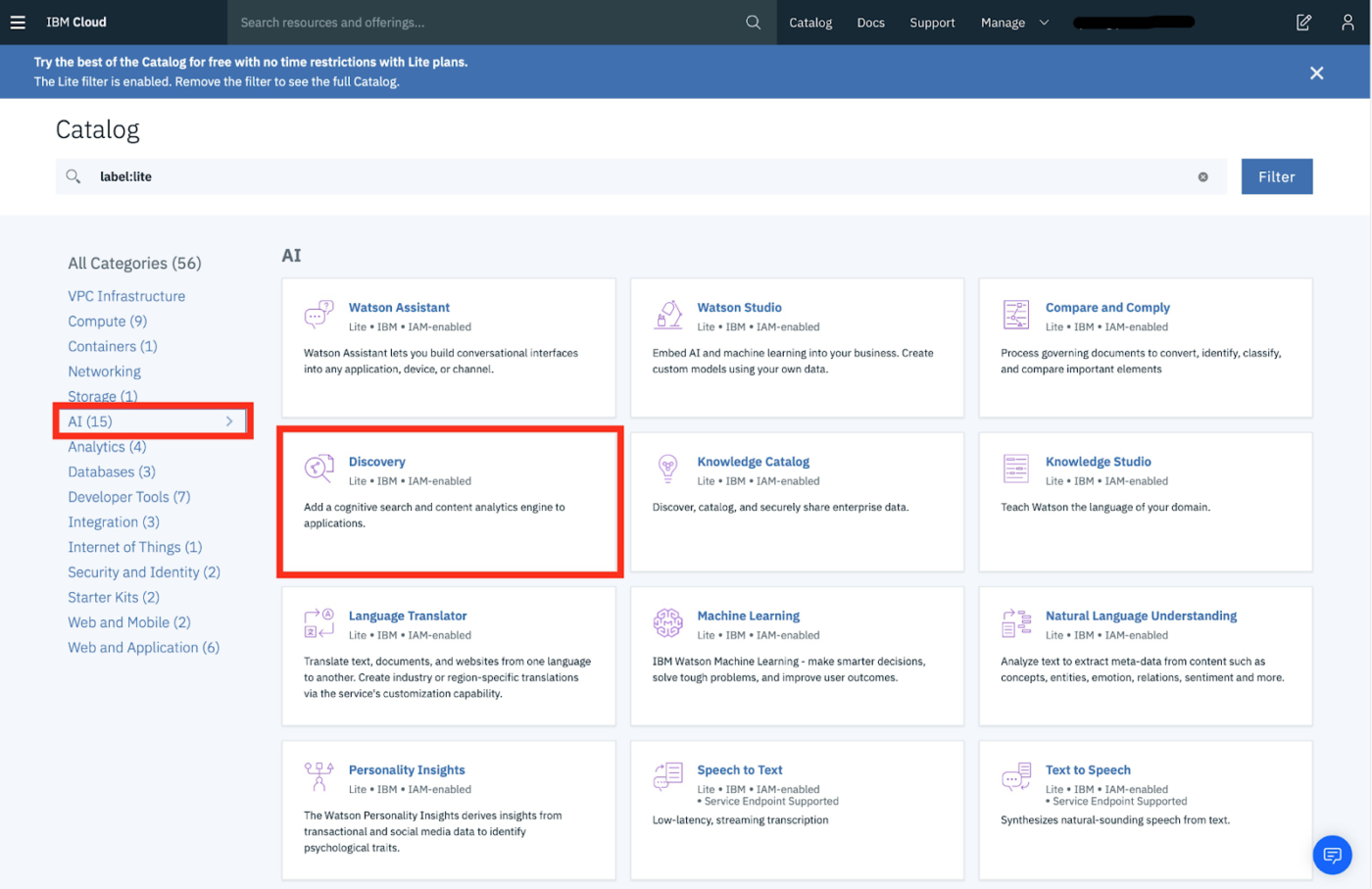
IBM Watson Discovery is an AI-powered search engine and content analysis tool that can be trained to recognize and extract domain-specific insights from complex, semi-structured documents like contracts or manuals.
Watson’s AI-powered Passage Retrieval identifies and returns the most relevant paragraphs or sentences within documents.
IBM Watson Discovery best features
- Access unified information by performing federated search across multiple content repositories through a single, streamlined interface
- Extract structured data from visually rich documents like tables, forms, and invoices using Visual Document Understanding
- Deploy flexibly across IBM Cloud, other cloud providers, or on-premises environments to meet your security, compliance, and infrastructure requirements
IBM Watson Discovery limitations
- Handling multiple simultaneous queries often causes the system to produce errors
- No real-time indexing—best for batch ingestion workflows
IBM Watson Discovery pricing
- Plus: Starts at $500
- Enterprise: Starts at $5000
- Premium: Custom pricing
- IBM Cloud Pak for Data Cartridge: Custom pricing
IBM Watson Discovery ratings and reviews
- G2: 4.5/5 (90+ reviews)
- Capterra: Not enough reviews
What are real-life users saying about IBM Watson Discovery?
A G2 review says:
🧐 Did You Know? Frequent task switching, often due to searching for information, can disrupt workflow. It takes time to regain focus, which cumulatively affects overall efficiency.
6. Lucidworks Fusion (Best for building large-scale, intelligent enterprise search apps with behavioral relevance)
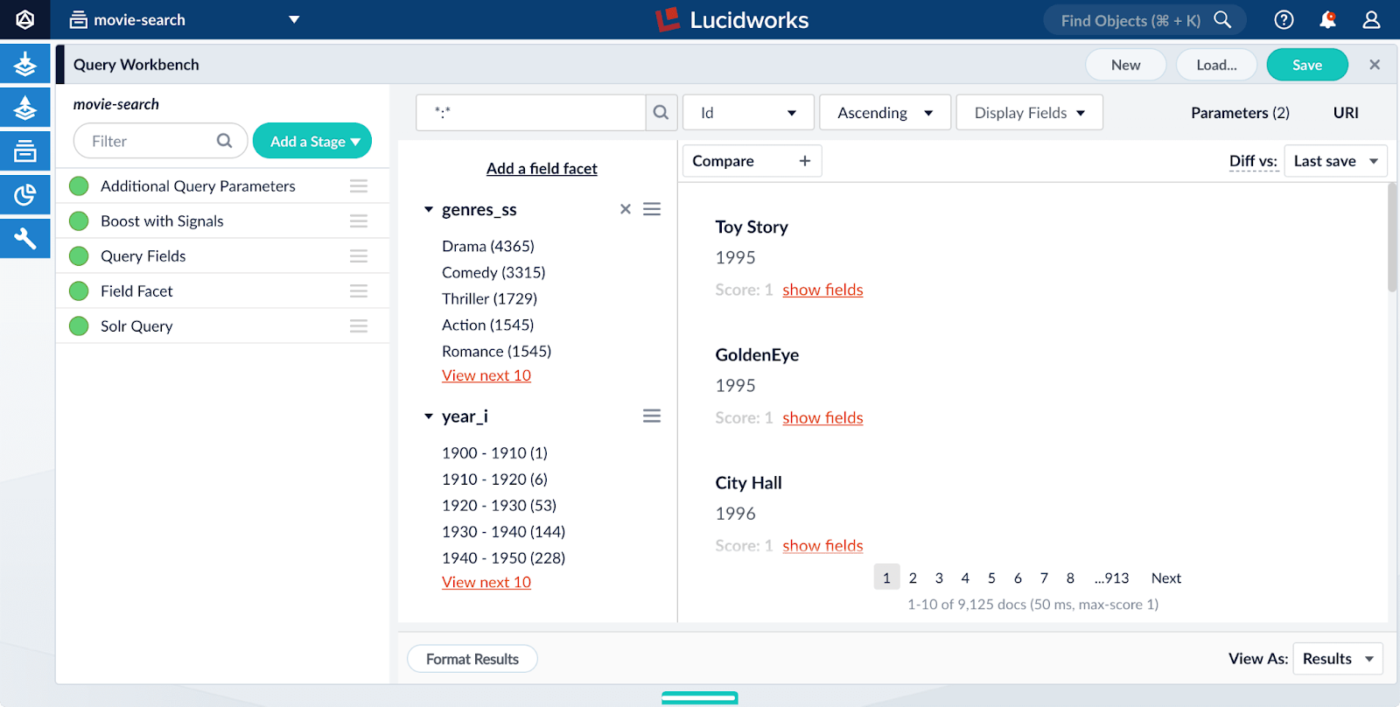
Lucidworks Fusion gives you the tools to deliver fast, intelligent search across complex datasets with behavior-based relevance tuning and powerful developer controls. Its Signal Processing Framework learns from user behavior such as clicks, queries, and interactions to improve relevance continuously.
Fusion handles everything from EHRs to e-commerce catalogs with real-time ingestion and flexible deployment options. Fusion’s modular architecture includes customizable Query Pipelines for pre- and post-query processing, enabling teams to build sophisticated retrieval logic. Use Faceted Navigation and Dynamic Filtering to zero in on specific attributes like treatment, product type, or source.
Lucidworks Fusion best features
- Build search apps quickly with App Studio’s low-code environment for both technical and non-technical users
- Integrate data seamlessly using 100+ connectors that unify databases, cloud storage, CRMs, and more into one index
- Enable semantic search with vector-based retrieval to find relevant results even without exact keyword matches
Lucidworks Fusion limitations
- Less flexibility when changing field data types
- Java 8 is required for some versions; compatibility issues with newer versions
Lucidworks Fusion pricing
- Custom pricing
Lucidworks Fusion ratings and reviews
- G2: Not enough reviews
- Capterra: Not enough reviews
What are real-life users saying about Lucidworks Fusion?
A G2 review says:
7. Azure AI Search (Best for blending traditional and semantic search in Microsoft-integrated environments)
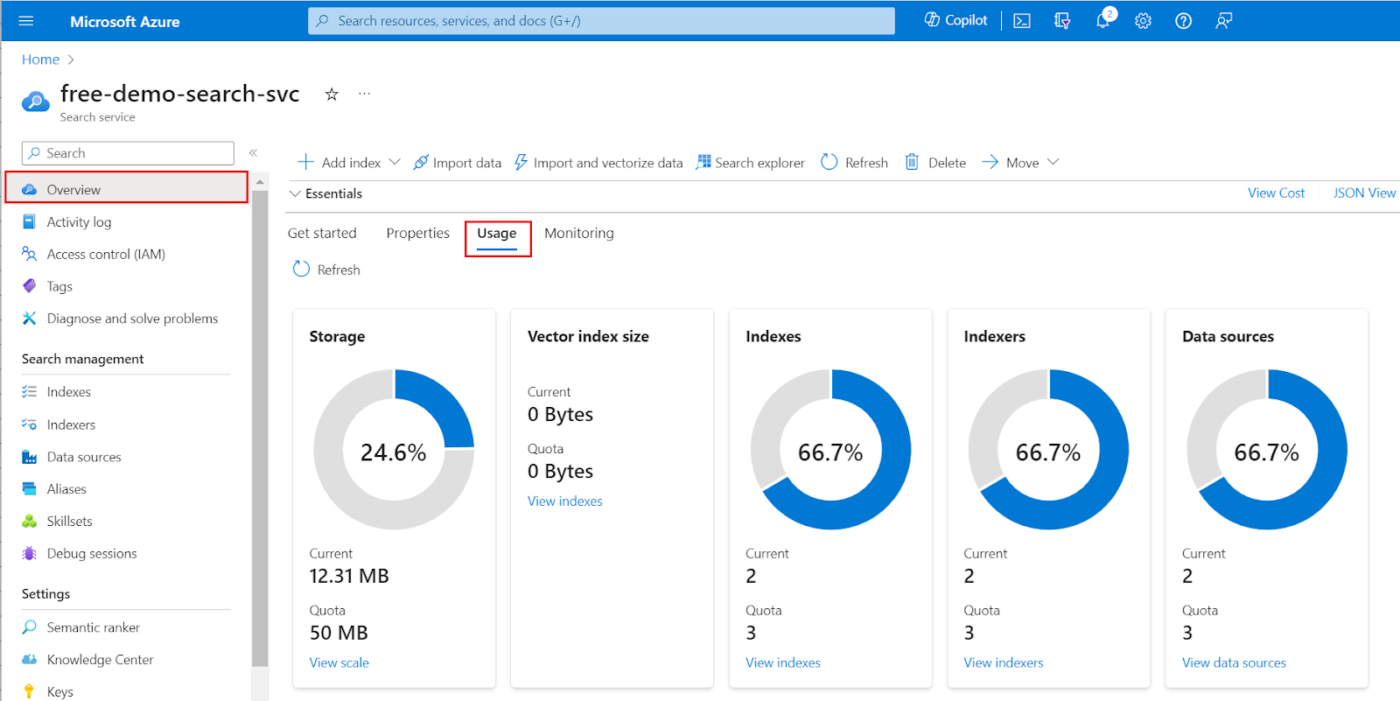
Azure AI Search is enterprise search software that delivers relevant results using traditional keyword and semantic search, plus full vector search support for similarity-based queries. It enriches your content during indexing using Azure Cognitive Services, applying entity recognition, sentiment analysis, and language detection to provide deeper insights and improve search accuracy.
For your work in media, manufacturing, or insurance, Azure AI Search’s multimodal capabilities let you search and analyze both images and text together.
Azure AI Search best features
- Enhances user experience by providing real-time search suggestions and autocomplete to help users find what they need faster
- Automates data ingestion by scheduling crawls from sources like Azure Blob Storage, Cosmos DB, and SQL databases to keep your index up to date
- Secures your data with fine-grained access controls integrated with Azure Active Directory and ensures only authorized users can access sensitive information
Azure AI Search limitations
- Azure AI Search sometimes misinterprets natural language queries and applies filters inaccurately
- Limited support for custom ranking without Azure Machine Learning integration
Azure AI Search pricing
Price per SU (Search unit)
- Free: $0/month
- Basic: $73.73/month
- Standard S1: $245.28/month
- Standard S2: $981.12/month
- Standard S3: $1,962.24/month
- Storage Optimised L1: $2,802.47/month
- Storage Optimised L2: $5,604.21/month
Azure AI Search ratings and reviews
- G2: 4.4/5 (30+ reviews)
- Capterra: Not enough reviews
What are real-life users saying about Azure AI Search?
A G2 review says:
8. Sinequa (Best for enterprise-wide knowledge discovery with advanced NLP and expert search)
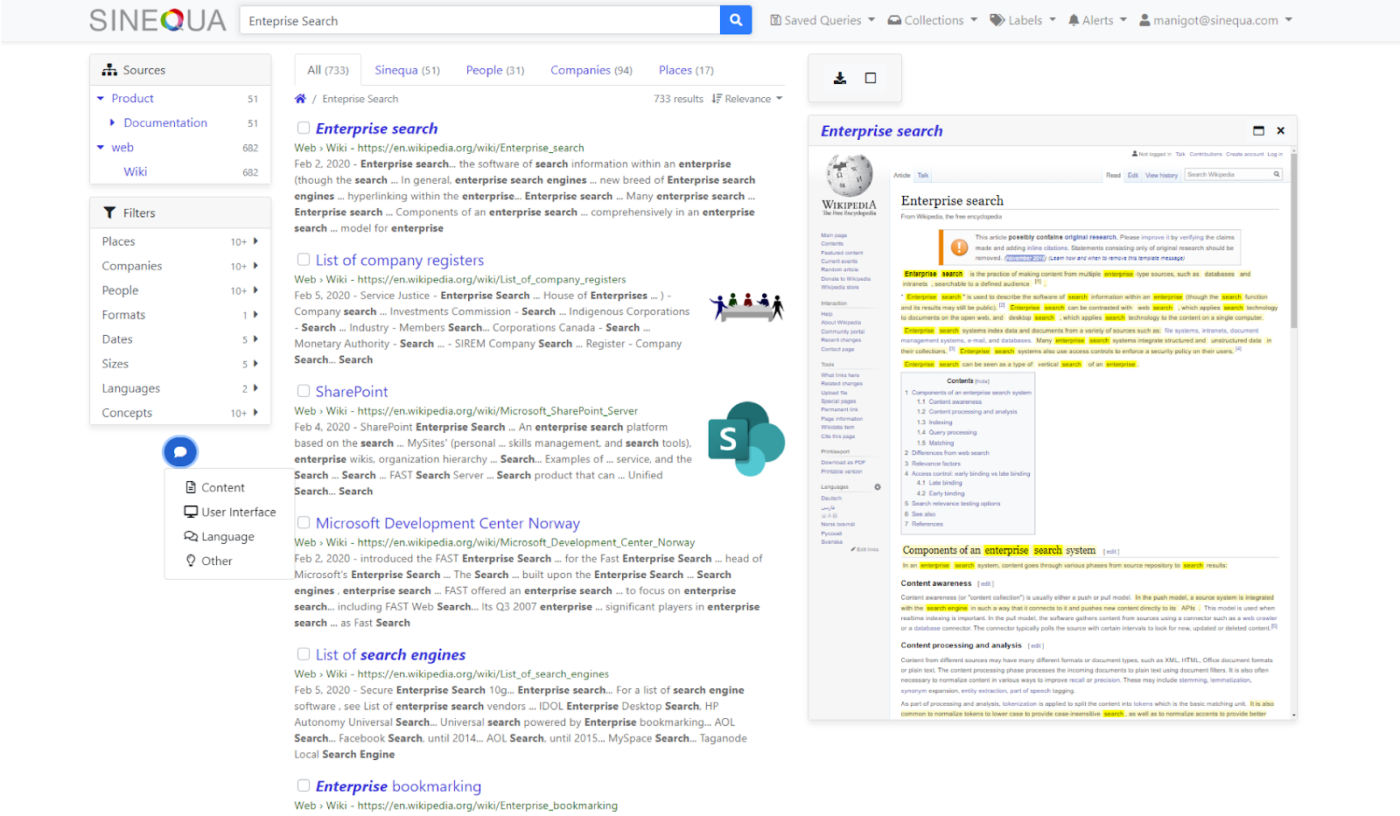
If you’re an enterprise looking to unlock the full value of your internal knowledge, Sinequa offers a knowledge management software powered by advanced AI and natural language processing.
When navigating complex documents, Sinequa lets you pinpoint specific slides or passages with tools like Document Navigator and Presentation Builder. It also supports Expert Discovery and Collaboration, identifying key subject matter experts within your organization to facilitate knowledge sharing through integrated chat and sharing features.
Sinequa best features
- Enables rapid creation and customization of AI-powered search assistants without any coding
- Ensures robust security and compliance by meeting standards like SOC 2 Type II, ISO 27001, and HIPAA to safeguard your sensitive enterprise data
- Supports multiple languages and data types by combining text with other formats to deliver richer, more comprehensive search experiences
Sinequa limitations
- Setting up and customizing Sinequa can be time-intensive and often requires specialized expertise
- Admin-level configuration is still required for “no-code” modules
Sinequa pricing
- Custom pricing
Sinequa ratings and reviews
- G2: Not enough reviews
- Capterra: Not enough reviews
What are real-life users saying about Sinequa?
A G2 review says:
9. Yext (Best for managing and optimizing branded search experiences across digital channels)
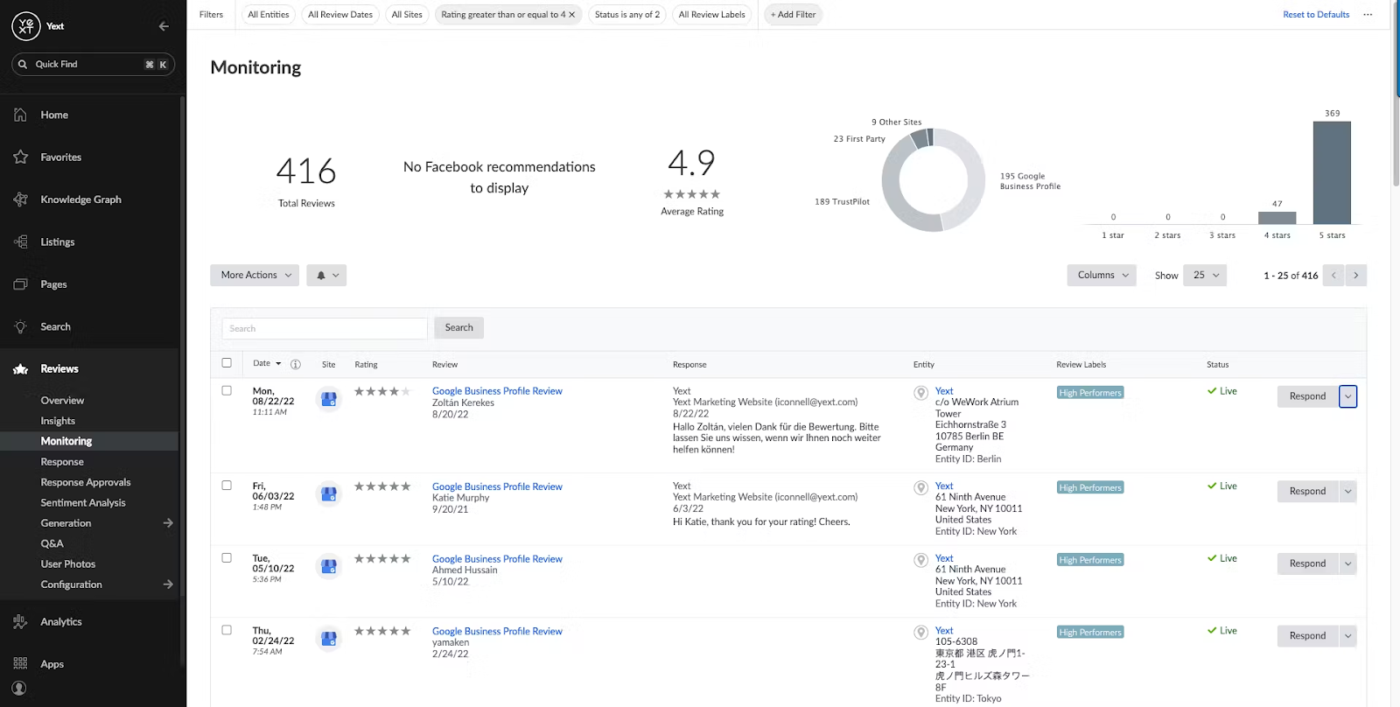
Yext is a digital experience platform that connects brand content across websites, search engines, and apps. Yext’s Federated Search unifies content across CMS, help desks, and internal knowledge bases, making it easy to deliver cohesive answers across touchpoints.
At its core is the Knowledge Graph, which structures your business data to ensure accuracy, improve search engine optimization, and power AI-driven experiences across digital touchpoints. Yext also offers intelligent Search capabilities for your website, delivering direct, accurate answers to user queries and improving overall user experience.
Yext best features
- Automates customer interactions with AI-powered chat solutions that handle conversations, collect user inputs, and execute configured tasks
- Manages and responds to reviews across platforms to improve customer engagement and boost local ratings and search rankings
- Gains actionable insights through custom reports and dashboards that help you track performance and refine your digital strategy
Yext limitations
- Some users struggle to export analytics with all key metrics while preserving interactivity
- Synonym and ranking control are limited compared to Elastic or Algolia
Yext pricing
- Emerging: $4/week or $199/year
- Essential: $9/week or $449/year
- Complete: $10/week or $499/year
- Premium: $19/week or $999/year
Yext ratings and reviews
- G2: 4.4/5 (740+ reviews)
- Capterra: 4.2/5 (100+ reviews)
What are real-life users saying about Yext?
A Capterra review says:
10. Luigi’s Box (Best for enhancing product discovery and conversion in e-commerce platforms)
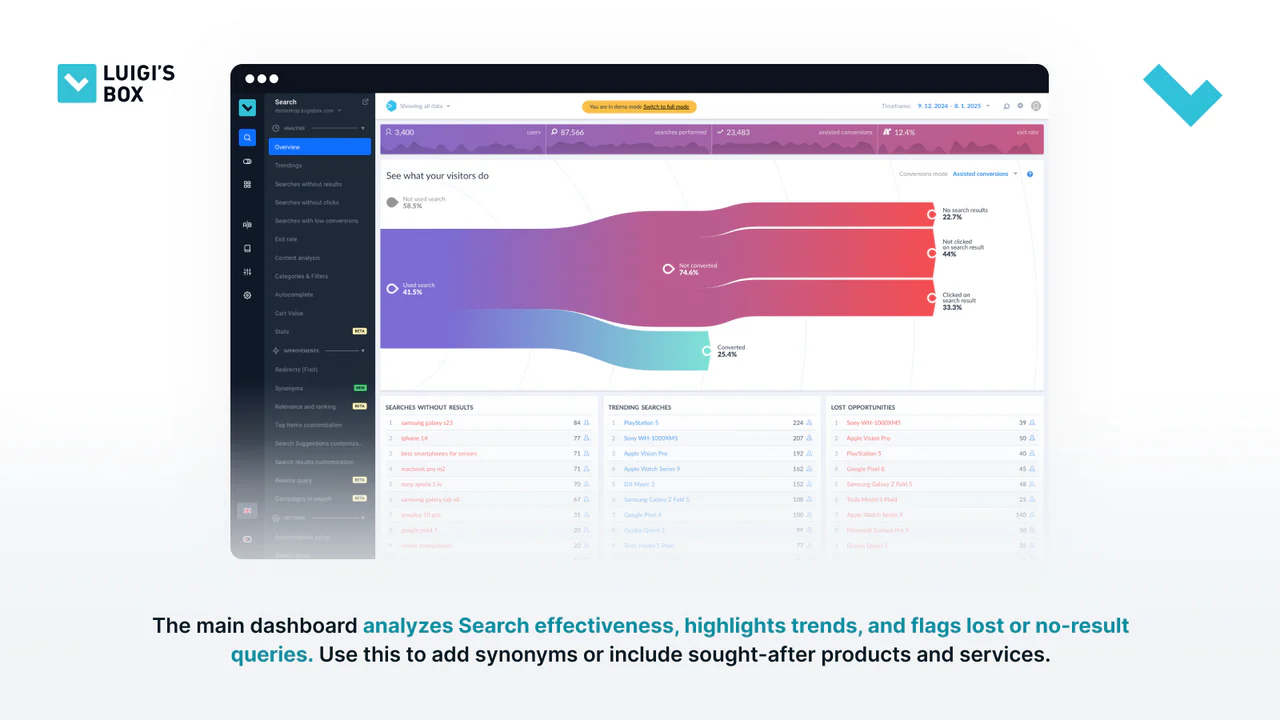
Luigi’s Box is purpose-built for e-commerce businesses that want to transform on-site search and product discovery into a competitive advantage. Voice and Visual Search adds a layer of convenience, letting your customers search by speaking or uploading an image instead of typing.
Advanced Analytics gives you a clear read on how users interact with your store so that you can fine-tune performance with data-backed decisions. And with multilingual and multicurrency support, you’re equipped to offer a seamless shopping experience to customers worldwide, no matter the language or currency.
Luigi’s Box best features
- Suggests complementary products, higher-margin items, and bundles, effectively driving upselling and cross-selling opportunities
- Enables customers to find desired products quickly using product codes
- Redirects users to relevant products when no exact matches are found
Luigi’s Box limitations
- Keyword-based search can fall short when product names are complex or unconventional
- Limited access to backend customization without enterprise-tier support
Luigi’s Box pricing
- Custom pricing
Luigi’s Box ratings and reviews
- G2: 4.8/5 (300+ reviews)
- Capterra: 4.9/5 (100+ reviews)
What are real-life users saying about Luigi’s Box?
A G2 review says:
11. Lucene (Best for developers who need full control to build custom search functionality from scratch)
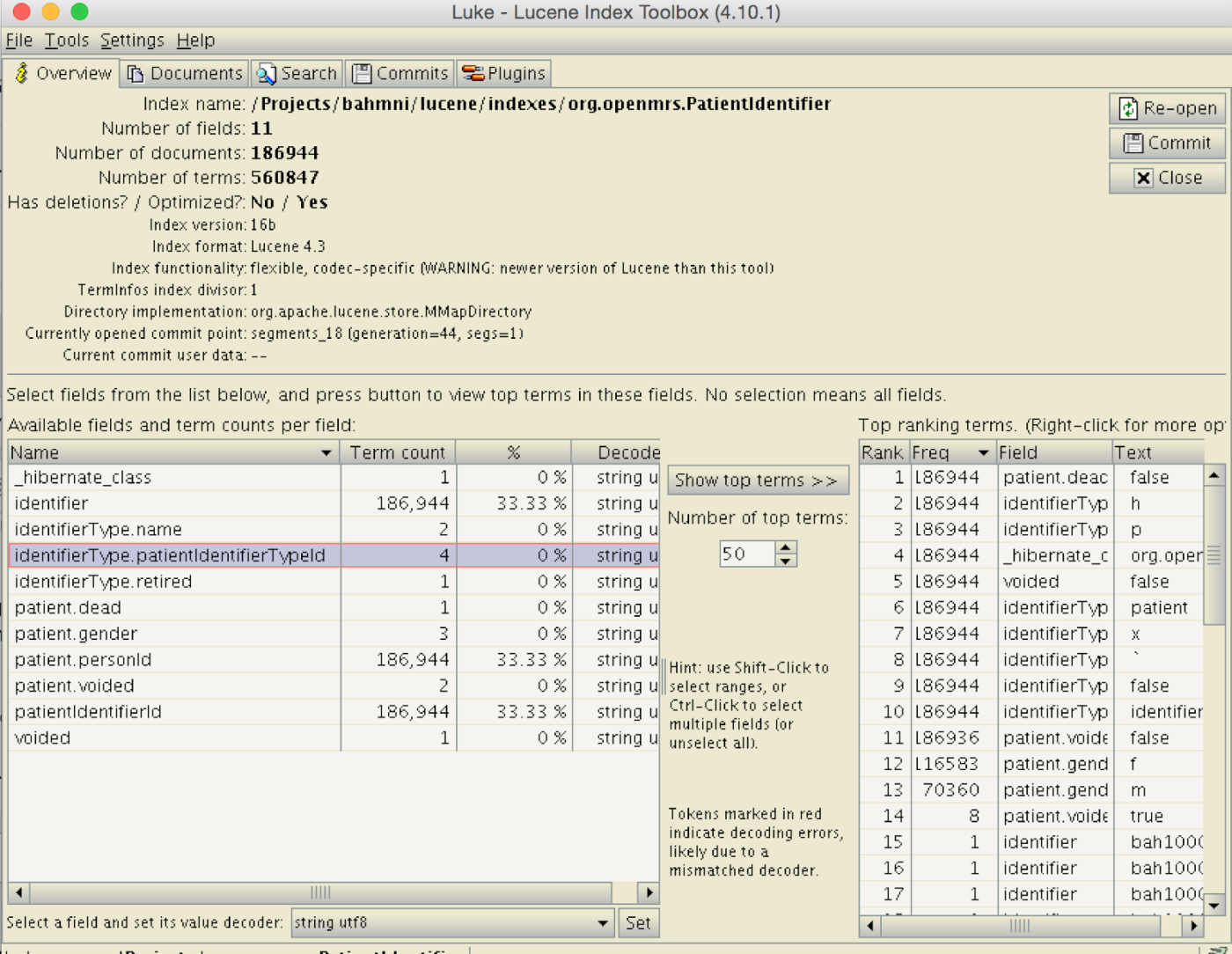
Lucene is a Java-based, high-performance open-source library for full-text search and the core engine behind Elasticsearch and Solr.
It supports near real-time indexing, custom tokenizers, and vector search for semantic similarity. Developers can create their analyzers, build ranking algorithms, and manage multiple index shards.
Lucene best features
- Searches within specific fields like title, author, or content to make queries more precise and targeted
- Sorts results by any field and applies dynamic facets to help users filter and navigate large result sets efficiently
- Queries across multiple indexes and merge results, enabling broader and more flexible search coverage
Lucene limitations
- Users report that the built-in feeder is tricky to set up and often unreliable during use
- Requires manual tuning for scalability and performance
Lucene pricing
- Free, open-source platform
Lucene ratings and reviews
- G2: Not enough reviews
- Capterra: Not enough reviews
What are real-life users saying about Lucene?
A G2 review says:
Unlock Powerful Search and Knowledge Management with ClickUp
Coveo offers strong search and knowledge management, but doesn’t fully integrate them with your daily work. 🧩
ClickUp combines tasks, documents, and knowledge into one platform. With Connected Search, you can instantly find anything across your workspace using smart filters and autosuggestions.
ClickUp Docs lets you create detailed, project-linked content, while Knowledge Management tools ensure accuracy and control access. AI-powered features like ClickUp Brain help you pull relevant info and generate drafts, saving time and boosting collaboration.
Unlike Coveo, ClickUp unifies search, knowledge, and workflows into one intelligent system. Whether you’re managing client docs, building onboarding guides, or improving internal access, ClickUp keeps your team aligned and agile.
Try ClickUp today and move faster, smarter, and more confidently. 🚀


